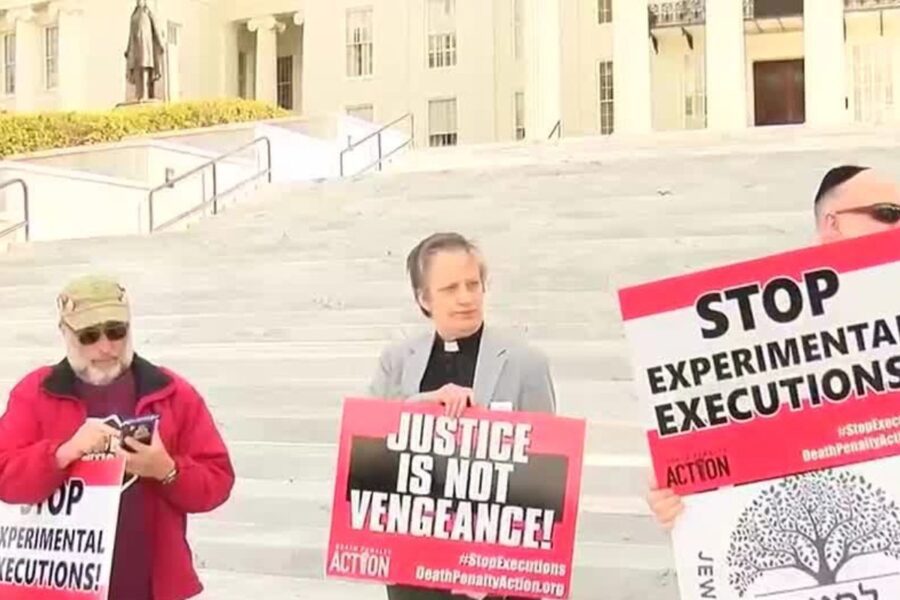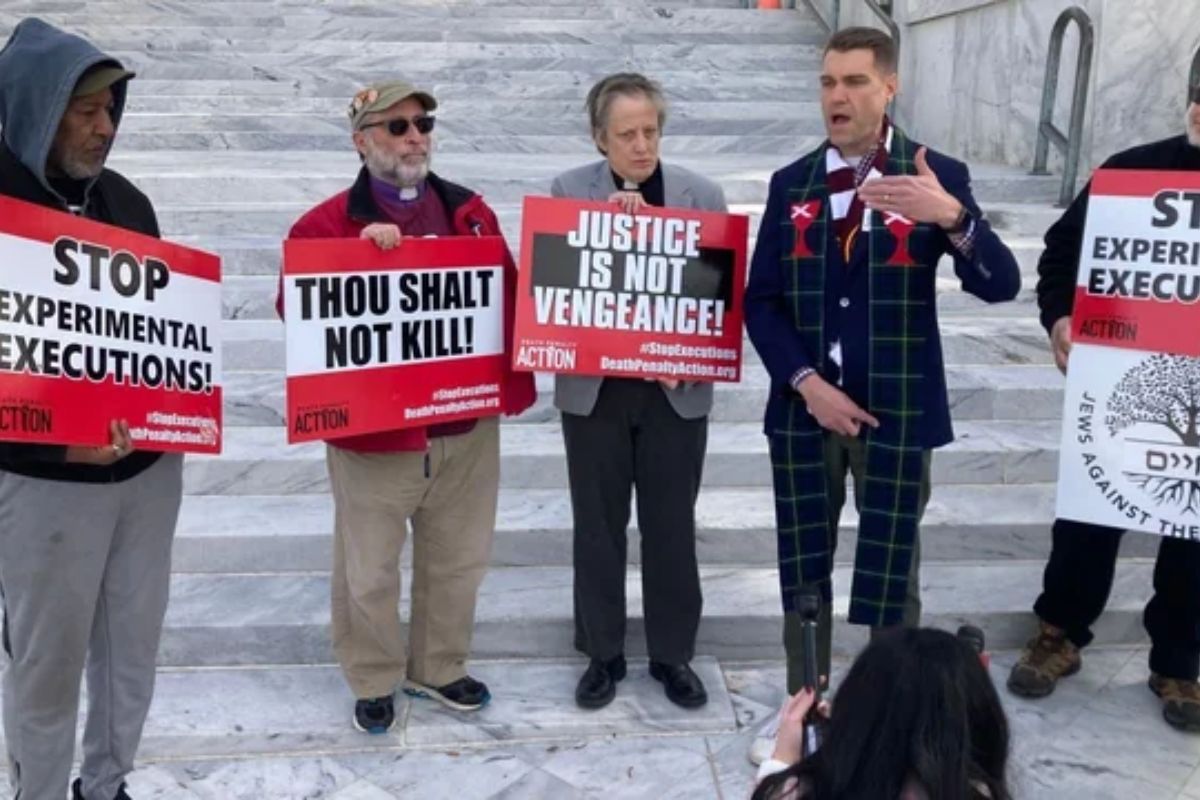Faith Leaders Rally Against First-of-its-Kind: A coalition of over 100 faith leaders has come together in Alabama to rally against the state’s first-ever execution using nitrogen hypoxia.
Led by Reverend Shane Isner, the group raises concerns about the safety and ethical implications of this untested method.
As Governor Ivey stands firm in her support for the execution, faith leaders urge a thorough exploration of alternative options.
This clash of perspectives highlights the complex moral and legal questions surrounding capital punishment in Alabama.
Key Takeaways
– Over 100 faith leaders from diverse religious denominations form a coalition opposing the use of nitrogen hypoxia as an execution method in Alabama.
– Faith leaders express concerns about the safety of nitrogen hypoxia, emphasizing the need for thorough examination and transparency regarding potential risks.
– Rev. Shane Isner calls for a comprehensive exploration of alternative execution methods before utilizing nitrogen hypoxia, questioning the urgency and advocating for a more humane approach.
– Governor Ivey supports the use of nitrogen hypoxia, citing legal authorization and assurances from relevant government agencies, prioritizing safety and upholding the law.
Faith Leaders Unite: Coalition of Over 100 Convenes to Halt Kenneth Smith’s Execution
Over 100 faith leaders have come together in a coalition to implore Governor Kay Ivey to halt the impending execution of Kenneth Smith, convicted of murder-for-hire in 1988, using a first-of-its-kind execution method in Alabama.
These faith leaders, representing a diverse range of religious denominations, have joined forces to advocate for mercy and compassion in the face of this unprecedented execution.
Their coalition aims to highlight the ethical and moral concerns surrounding the use of nitrogen hypoxia as a means of capital punishment. They argue that this untested method violates the sanctity of life and fails to align with their religious beliefs that value forgiveness and redemption.
Faith Leaders Raise Concerns About Nitrogen Hypoxia’s Safety
Faith leaders express heightened concerns about the safety of using nitrogen hypoxia as a method of execution, emphasizing the need for thorough examination and transparency regarding its potential risks.
They argue that since nitrogen hypoxia is an untested execution method, there are unknown variables that could pose significant dangers. The clergy members believe that the lack of prior use and research on this method leaves them in uncharted territory, where the potential risks are not fully understood.
They assert that without a comprehensive understanding of the safety protocols associated with nitrogen hypoxia, there is a risk of harm not only to the condemned individual but also to the spiritual advisor and prison staff present during the execution.
The faith leaders call for a detailed examination of the potential risks involved and urge for transparency in disclosing the safety measures in place.
Rev. Shane Isner Urges Thorough Exploration of Alternatives
Rev. Shane Isner, a prominent religious leader, calls for a comprehensive examination of alternative methods, raising doubts about the urgency of the first-of-its-kind execution in Alabama. Isner’s concerns stem from the use of nitrogen hypoxia, an untested method of execution. He questions whether this uncharted territory is the most appropriate path to pursue.
Isner believes that before proceeding with such a significant step, it is crucial to thoroughly explore other alternatives that may offer a more humane approach. In a letter delivered to the governor’s office, Isner and other faith leaders express their reservations and urge a careful consideration of all options. They argue that taking the time to thoroughly examine alternative methods is not only morally responsible but also necessary to ensure that justice is served in a manner consistent with our values.
Governor Ivey’s Stance: Support for Nitrogen Hypoxia and Legal Authorization
Governor Ivey continues to stand firmly in support of the use of nitrogen hypoxia as an execution method, citing both the legal authorization and assurances from relevant government agencies.
She points to the law passed in 2018, which specifically authorized the use of nitrogen hypoxia as an alternative method of execution. Additionally, the Department of Corrections and the Attorney General’s office have provided assurances that all necessary protocols are in place to ensure the safe and lawful implementation of this method.
Governor Ivey emphasizes that the execution method adheres to established legal procedures and prioritizes the safety of those involved. Her stance reflects confidence in the system and a commitment to upholding the law while carrying out the ultimate punishment.

READ MORE: First Nitrogen Gas Execution. How Will It Work and Risks?
Ethical Concerns Surrounding Alabama’s Execution Method
The clash between proponents of capital punishment and religious leaders expressing ethical concerns adds a layer of complexity to the ongoing discourse surrounding Alabama’s execution method. While proponents argue that capital punishment serves as a deterrent and brings justice to victims and their families, faith leaders raise profound ethical concerns regarding the morality of taking a life, even in cases of heinous crimes.
They question the rush to implement a novel execution method, such as nitrogen hypoxia, without a comprehensive examination of its implications. The ethical concerns raised by religious leaders extend beyond the act of execution itself to include the potential for wrongful convictions, the disproportionate impact on marginalized communities, and the lack of focus on restorative justice.
These differing perspectives highlight the need for a deeper examination of the ethical implications of Alabama’s execution method.
Conclusion Of Faith Leaders Rally Against First-of-its-Kind
The faith leaders’ rally against the first-of-its-kind execution in Alabama highlights their concerns about the safety and ethical implications of using nitrogen hypoxia as a method of execution.
The coalition of over 100 faith leaders is urging a thorough exploration of alternative execution methods and questioning the urgency of proceeding with Kenneth Smith’s execution.
Governor Ivey’s support for nitrogen hypoxia and legal authorization adds to the clash of perspectives surrounding this execution method.
Our Reader’s Queries
What is the new execution method nitrogen hypoxia?
Carrying out an execution using nitrogen hypoxia entails compelling an individual to inhale only nitrogen, cutting off their oxygen supply for bodily functions, ultimately causing death. The U.S. Chemical Safety Board emphasizes that breathing pure nitrogen is safe only when it’s mixed with oxygen.
Who was the man executed with nitrogen?
In Atmore, Alabama, Kenneth Eugene Smith, found guilty in a 1988 murder-for-hire scheme, might make history as the initial death row inmate executed through nitrogen hypoxia in the U.S.
What gas is used for execution?
Back in 1924, Nevada introduced the use of cyanide gas in its quest for a more humane method of executing condemned prisoners. The first individual to face lethal gas was Gee Jon, with the state attempting to pump cyanide gas into Jon’s cell while he was asleep.
What chemical is used to execute?
The administered drugs include pancuronium bromide, a paralyzing agent; potassium chloride, which halts cardiac activity; and sodium thiopental, serving as an anesthetic.
Is death by nitrogen hypoxia painless?
Having experienced altitude hypoxia simulation during his training as a former Air Force and Delta Airlines pilot, Lippincott is confident that death by nitrogen hypoxia would be painless. He described the sensation as akin to feeling sleepy with a warm sensation.

